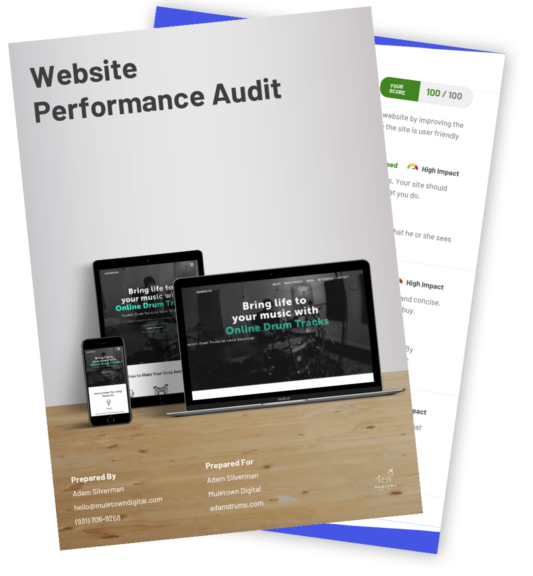When people book in online to chat with our team at Muletown Digital the number one reason we get is “I need to build a new website”. It’s clear to me that many businesses see this as a valuable investment, and it often is, but before you decide it’s really time to rebuild, there are some things you should really consider.
This article will help you understand the thinking that goes into creating an appropriate website for your business.

What is the job of your website?
This is ALWAYS the first question you need to answer when you’re thinking about building a new (or your first) website. Of the hundreds of websites we look at each month, there are a very few of them that actually do a job in people’s businesses. Most of the time, the primary function they serve is to tell clients about the services or products that a business offers. This is a terrible thing to do with your website. That’s informational and great if the client already knows your business and is already wanting to work with you, but I’d say 95% of the time, that isn’t the case.
Your website should DO something for you. It should be a lead generation machine, an email capturing machine, a call booking machine, an appointment setting machine, etc. Before you have designs started (the fun part) you really need to know what you’re trying to get out of it and how that will help you grow your business.
For example, at Muletown Digital, we hope people will book calls to talk with our strategy team because that’s where we can be the most helpful. So everything we have is pointed at booking a time to talk. For a plumber, it would be a phone call or appointment booked. For a veterinary clinic, it would be to drive people to the facility, or have them fill out a new patient form. For a basket-making company, it would be to show off the baskets and facilitate sales online. There should always be a primary reason for actually having a website.
Figure out your primary objective, secondary objective, and the “if-all-else-fails” objective too!
Who is your website going to talk to?
Your website audience is also going to be a big deal. You need to identify who your target client is, what they want, and then how you can help them get it.
- What does their life look like after you solve their problem with your product or service?
- Why would they want to work with you over someone else that does or sells the same thing that you do?
- What makes them happy, scared, sad, feel powerful, etc.
- Does your ideal client understand what you do at a deep level or just at the surface?
You really need to get inside of your target audience’s head to think through how to position your website to speak to them.
If you’re dealing with impatient people, you’d better use your website to get to the point. If you sell car parts for people that own Range Rovers, you could assume they have little time and lots of money, so you’d want to target your messaging towards how you can save them time with your service.
If you’re selling discounted refurbished tires, you know you’re looking at a market that’s going to do DIY work, and likely knows more about cars than you do. You should know your audience very well before diving into a website.

Where is your website traffic going to come from?
We’ve written many other articles about this, but the old “if we build it they will come” scenario on the internet stopped working about 10 years ago. You have to have ways to drive traffic to your website.
You can either buy traffic with PPC or Facebook Ads, Instagram Ads OR you can earn traffic with Social Media and Organic SEO. Somehow, something has to tell people that your website is there and what you offer on it. Without traffic your website project could be amazing and you’ll look awesome, but you’ll have very little to no ROI off of the work you’ve done.
You want to make sure whatever you do that you’re bringing in the right types of clients (going back to who your client is). If you’re bringing in the wrong people you’re just paying for traffic to come to your site that won’t buy or work with you. So be careful you know exactly what the plan is for this traffic source!
How do you get them to come back to your website?
It’s awesome to get a new visitor to your website from any source! Once they are there, do you have any way to capture them? Using a lead capture form, getting them to sign up for some sort of download? You might do a really great job on your website of converting users and maybe they do exactly what you were hoping for the first time, but what if they don’t? Having a way to ensure that you can still communicate with potential clients after they have visited and left your website is VERY important!
You can use Google Analytics and Google Search Console to track where users come into your site, and where they leave. Understanding that would help you position lead capture forms on your website to make sure you’ve captured them before they leave your site!

What is your Unique Selling point? How do you communicate that in your business?
Currently, there are likely billions of websites in existence and nobody is naive enough to think that their website has never been done before. Websites by nature will follow some sort of pattern. The reason for that pattern is that users behave a certain way online depending on what you’re offering them. There is a deep science associated with how Leah, our Lead Designer and the rest of our design team handle website design.
Since you’re not going to have the only website like yours – or even in your industry – or your industry in your location (there are typically many competitors even in a 50 mile radius of your business) you have to communicate what you do and why you’re different.
Do you have a different process than other places? Offer a better promise or guarantee? Do you work in a specific sector in your market? Make sure you can explain how you and your business differ from the competition. Hint hint, make it as clear and concise as possible!
Who is going to handle your website content strategy?
At Muletown Digital we have a pretty strict policy about website content because the ENTIRE capability of your website depends on what it says. We handle content for our clients about 99% of the time. Most of our clients are not professional copywriters, and even if they are, they aren’t specialized in website content.
Make sure if you’re planning to handle your own website content that you have a plan from start to finish for each page. Many websites have different types of pages from sales pages, lead generation pages, informational pages, etc. Make sure you identify the purpose of each page and write your content around the use case for the page. Don’t make the mistake of talking all about your business and what you do. That’s great for search bots but really bad for human engagement!

Who is going to build your website?
I’ll be honest here, I spend a whole lot of time playing around with the machines on our family farm. From old trucks to UTV’s to our 4000-pound tractor, typically I’ll be under the hood of one of them. The life lesson I’ve learned is that sometimes it’s an easy fix and sometimes you’re about to drop a 500-pound tire on your foot
The moral of the story is that you need to know when to get an expert. If it involves electrical, water, or something that weighs more than 10 of me, I call in a pro. A successful business website is ALMOST ALWAYS a place where an expert is needed.
Websites include everything from strategy, wireframing, prototyping, design, development, Q/A testing, and more. Even in the industry a website designer typically is not a good coder, a coder will not understand SEO, and SEO person will not understand good user interfacing, etc. You need a killer team to deliver a successful outcome.
Some people will argue that if you just need a simple website, why not just do that on Squarespace? I always counter with the thought that if your website isn’t going to do anything for your business, why even bother doing it? MTD would die if our website was gone because it does all of our digital marketing for us. If you’re planning to build a website that has no impact on your business, you’re likely reading the wrong website right now. We believe a website should 100% do a JOB for your business.
How to get in touch with Us
When you need a group of experts to come in and help you build a digital presence your competition will be seriously concerned about, that’s what we’re here for! Book a call today to see how we can help!
I hope you’ve found this information useful. As always, if you’re not sure what you need, or you know exactly what you need, you can reach out to us online and book a FREE consultation.
Muletown Digital offer Web Design services to businesses throughout Tennessee, including Columbia, Nashville, Spring Hill, Brentwood and Franklin.



